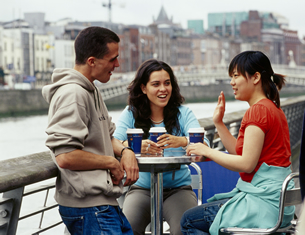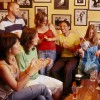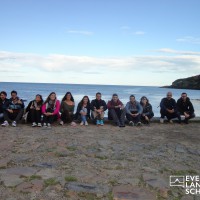 Dublin is an ideal destination to study English. It is the capital of the Republic of Ireland and while walking throughout its streets you can feel a charming and spicy mix of culture, freedom, history and art.
Dublin is an ideal destination to study English. It is the capital of the Republic of Ireland and while walking throughout its streets you can feel a charming and spicy mix of culture, freedom, history and art.
Dublin is a lovely city and this is one of the reasons why it has become a popular destination for educational trips. In order to live and study English in Dublin, it is good to bear in mind two important events that marked its history: one is the struggle for the independence from England, which held Ireland for seven centuries, and the other is the conflicts between Catholics and Protestants. Careful! On these two topics the Irish are sensitive and it is best to be careful with your comments.
To understand a bit how this magnificent city is, let’s start from the first century BC near the River Liffey, when the city was founded by the Vikings. Nowadays, from any of the bridges crossing the river, you can enjoy a phenomenal sunset. Let’s keep going with the history of Dublin.
In mid V century, St. Patrick, the patron saint of Ireland, introduced Christianity in Ireland , which was a variant of Roman Christianity: in fact, it also borrowed religious elements of the Druids and pagan rituals. In his name, every March 17, Irish people worldwide gather and join in a drinking party, where everyone is dressed in green, the national color.
It is impossible to summarize the history of Dublin in a few paragraphs! However, we can point out some events that have marked the city. Shall we get started?
1170. Henry II invades Ireland and the island becomes a dominion of the Norman kings of England.
1530. Henry VIII rebels against the Pope. He imposes Anglicanism and begins hunting and oppressing the Catholics.
1601. It is promulgated the Act of Supremacy, which imposes that the high offices of the state are covered only by Englishmen and the Protestants.
From 1640 to 1682. Dublin's population increases from 10. 000 to 60. 000 inhabitants. A consistent number of Englishmen, Dutch people and Jews get to Ireland. The differences between Catholics and Protestants are enormous, to the extent that the first could not inherit land, marry a person of another religion and even own a horse.
1801. England crushes the Irish Parliament. The Catholics recover some basic rights. Ireland integrates fully in the UK.
1845-1849. The Great Famine destroys the crops of potatoes. One million people dies and another half million leaves the country.
1905. Sinn Féin movement is founded by the journalist Arthur Griffith, to achieve independence from the British monarchy.
From 1922 to 1923. The Civil War leads to the recognition of the Irish Free State. Freedom comes at last!
1922. Not everyone is happy with the political decisions made. Northern Ireland does not accept the Irish Free State and its conditions and it stands up for independence. Ireland is split into two parts.
1948-1950. A huge number of Irish people leaves the island, due to the conflicts between Northern Ireland and Ireland. The largest group heads for the United States.
1949. The Republic of Ireland is born. The country takes off towards progress and Dublin begins standing out as an attractive and important city for business, science, research and the arts.
The history of Ireland has a bit of everything: wars, conflicts, despotic kings and magic faith. What is undeniable is the passion of these people for their past and glorious moments relating to wise people, saints and heroes.
Dubliners, a culture full of passion and humor
When taking an English course in Dublin, you will notice that in Ireland two languages are spoken: English, the official language and Irish, also known as modern Gaelic. Originally coming from Celtic languages, in modern Gaelic there are no direct expressions such as "yes", "no" and "to own". What do you think of it?
Dubliners are characterized by the militancy and the passion through which they defend their roots. On the other hand, it also highlights their fairness and kindness in dealing. Their sense of humor is spicy and pungent. Each statue in town is pointed with a nickname, ranging from the commonplace to the smartness in the pun. For example, the statue of James Joyce is known as "The Prick With The Stick" and the statue of Oscar Wilde is called "The Fag on the Crag".
Dubliners believe in ancient Celtic and Viking myths. Keep in mind that they were never conquered by the Romans. A very interesting and fun myth says that in Ireland there are some leprechauns, a sort of redheaded elves wearing green hats, who appear when a rainbow joins the heaven with the earth. These lads seem to own a lot of gold and they offer it to whoever looks into their eyes. At this point, you know the secret to turn an educational trip to Dublin to learn English into a treasure hunt.
If something makes the Dubliners feel proud of themselves is the amazing amount of writers, musicians and artists of quality who were born and raised in Dublin. With a population of just five million people, Ireland was given 4 nobel prizes for literature: William Butler Yeats (1923), Bernard Shaw (1925), Samuel Beckett (1969), who wrote the shortest play ever released, which lasts 30 seconds and it is called Breath-and Seamus Heaney (1995). A glance at the music and here you find characters like Sinead O'Connor, who was a waitress at the Bad Ass Café-bar and U2, who sang in the streets of Dublin many times.
Actually, U2 used to play by the door of the same pub, where lots of people used to meet to listen to them, blocking the entrance to the bar. The owner sent the group away more than once. Bono, in a fit of anger, one day said that when he was rich and famous, he would buy the pub and put the owner on the street. In fact, he went further: he bought the pub and the whole building, now called The Clarence Hotel.
Dublin will change you forever. Dare to live it!





























.jpg)



























.jpeg)

 Dublin is an ideal destination to study English. It is the capital of the Republic of Ireland and while walking throughout its streets you can feel a charming and spicy mix of culture, freedom, history and art.
Dublin is an ideal destination to study English. It is the capital of the Republic of Ireland and while walking throughout its streets you can feel a charming and spicy mix of culture, freedom, history and art. Exterior de sem estudar onde?
Exterior de sem estudar onde?